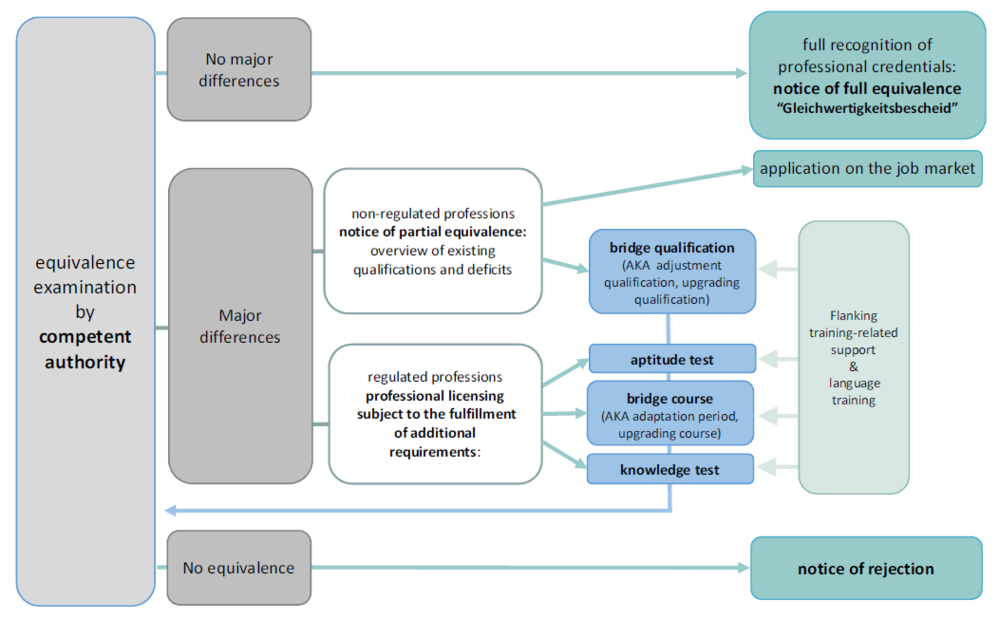The recognition process
Since the entry into force of the recognition legislation in 2012, every person with a foreign qualification has a legal entitlement to a recognition process for his or her foreign qualification. The procedure is open to everyone, regardless of citizenship or residency status - and is thus also open to asylum seekers and tolerated persons. Anyone who wants to make an application from abroad should get information about the opportunities for living and working in Germany before arrival, for example on make-it-in-germany or via the "Arbeiten und Leben in Deutschland" hotline (+49 30 1815 1111). Anyone who already knows where they will live in Germany can also directly consult a local IQ advice centre .
Procedure
A recognition process is possible for school, academic and vocational qualifications. The process starts with an application to examine the equivalence of a foreign vocational qualification. The application is submitted to the recognition centre responsible for the professions concerned. Depending on the federal state and profession, different centres are responsible for checking equivalence. If the German reference profession is known, the appropriate recognition centre can be found using the recognition finder in the "Anerkennung in Deutschland" portal. Personal support is available from the IQ advice centres. They provide information for interested parties and support them step-by-step during the recognition process.
The recognition centre compares the foreign vocational qualification with a German reference profession, for example in terms of the length of training. Several results are possible:
1. There are no major differences between the German and foreign vocational qualification, the foreign qualification is "fully equivalent". The applicants receive a so-called equivalence certificate and legally they are equal to people with a German vocational qualification.
2. There is no equivalence between the foreign and German qualification or the matter cannot be clarified. The application is rejected.
3. There are considerable differences between the foreign and German vocational qualification. The recognition centre then carries out an individual check. This investigates whether the considerable differences can be compensated for by work experience or other proof. If this is the case, an equivalence certificate is also issued. If the work experience cannot compensate for the differences, but the foreign qualification and the German one are partially comparable, the applicants in regulated professions receive a decision with the condition of a harmonization scheme. Anyone who completes the harmonization scheme will receive full equivalence. In non-regulated professions you receive a decision of "partial equivalence" and can use this to apply directly on the labour market. Anyone who wants to, can complete adjustment training and then apply for full equivalence again. The IQ support programme offers training schemes for many professions to harmonize considerable differences from a German profession.
Look on our interactive map for a training scheme near you.
Regulated Profession
In regulated professions, the recognition of foreign qualifications is essential for being able to practice the profession or use a certain job title. A specialist law or a legal or administrative regulation specifies which qualifications need to be proved. There are 81 professions that are regulated by federal state law, for example, doctor, nurse and various skilled trades and master trades. There are also 18 professions regulated by federal state law, such as teacher or preschool teacher. A list of all the professions that are regulated in Germany can be found on "Recognition in Germany".
Not regulated profession
Not regulated means that access to and practice of the profession are not tied to certain government requirements. The profession can therefore be practiced without government approval. At federal level this refers to around 330 apprenticeship professions in the federal dual system and around 180 further training qualifications under the Vocational Training Act and Skilled Trades Code.
Professions governed by federal law
In professions governed by federal law, federal laws or ordinances govern professional training and further training. These can be specialist laws, such as the Federal Medical Code or, for example, further training ordinances for master trades. Regulated and non-regulated professions come under professions governed by federal law.
Professions governed by state law
In professions governed by state law, laws or ordinances at the level of the federal states govern professional training and further training. Regulated and non-regulated professions come under professions governed by federal state law.
Duration and Costs
Usually, the process should not take more than three months from submission of the complete documentation. The applicant must pay the fees for the process him or herself. The level is based on the fee regulations of the recognition centres and depends on the individual complexity of the process. The fees are usually required as an advance payment. Agencies for employment and job centres can assume the process costs for their clients under certain circumstances. The costs for any necessary harmonization training schemes can also be assumed. Funding must be discussed in individual cases with the staff at the agency for employment or job centre. Since 2015 it has also been possible to avail yourself of a harmonization training scheme free of charge via the IQ support programme, sometimes it is also possible for indirect costs, e.g. travel expenses, to be paid.

